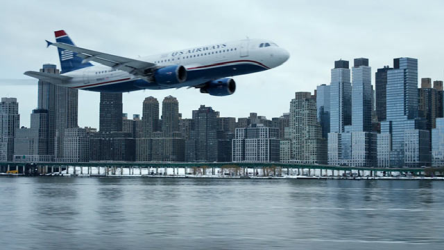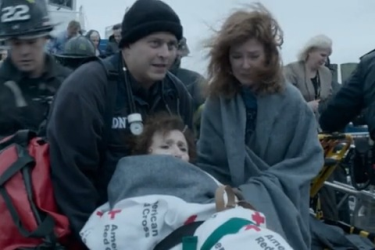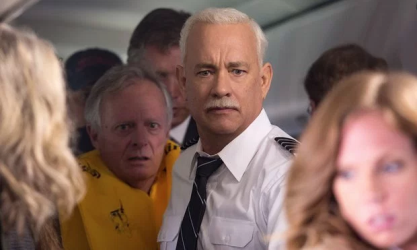The Flower has been a big Clint Eastwood fan since (at a young age that makes me a bad parent) she fell in love with Gran Torino—probably her favorite movie for years until she saw Silence of the Lambs. (Yeah, whatever, Child Protective Services.) So, she was anxious enough to see Sully and has enough confidence in Clint Eastwood to have wanted to see this film on the day we went to the Halloween Haunt. (We went to see Don’t Breathe instead, though.)

“Ladies and Gentlemen, the crew knows you have a lot of choices in movies, and would like to thank you for choosing SULLY…”
This is a really, really fine film. One of Eastwood’s best, and that’s saying something. The Flower has also been on a Norm MacDonald kick lately, and was relating how he had a good bit on having filmed the life of the airline pilot—but tragically before “The Miracle on the Hudson”, so he had no ending. (Norm did this bit right after the incident, so years before this movie.) But this movie isn’t really about Captain Sullenberg’s remarkable landing in the river but—I’m going to go out on a limb here and say this is an extension of Clint Eastwood’s “empty chair” RNC speech in 2012—a story about people who do things, and those who do nothing but sit in judgment of people who do things. And despite the film’s 82% RT score from critics, a quick glance at the negative reviews pretty well confirms that a lot of critics see that, too. (More on that in a moment.)
The movie takes place right after the fateful landing (with copious flashbacks) as the workaday pilot—with a flawless forty year record—becomes both instant hero and instant goat. And I remember this at the time: The Internet was rife with Monday Morning Quarterbacking suggesting he didn’t really need to land the plane in the river. Because, you know, he was just some hot dog pilot who wanted to do that, apparently. Those voices were echoed in the news media (notably by Katie Couric, who plays herself as unselfconscious and unaware as one could hope), who are always just sure there’s either a hero or villain in any story, and as much as they love either, they love making a guy the former and then turning him into the latter. Perhaps even more seriously, however, is the hearing from the National Transportation Safety Board, the federal body that passes judgment on pilots (as directed by the Constitution in article Are-You-Serious?).

Picture: Pilot on a lark, having a bit of a larf.
So, yeah, a lot of the criticism directed at this movie is along the lines of how-DARE-you-slur-the-fine-people-at-the-NTSB-for-your-tawdry-little-drama! which is the sort of thing we might call “letting the mask fall” if anyone had really been fooled by the mask in the first place.
Both Eastwood and Sully are working on a different principle: The drama in the film comes from an ordinary man thrust into an extraordinary situation that he handles to the best of his ability, and which—with the help of a whole lot of other ordinary people—turns out in the best of all possible ways. In a lot of ways, this was the movie I needed to see at this particular moment in time, so I may be rating it higher than it deserves (though the kids both really liked it, too). Allow me a digression—like you can stop me (though you can skip the rant).
It’s hard not to look at the state of the nation (and the world, even) and not feel as though we’re “hollowed out”. Every society goes from stoic to epicurean, per Will Durant, and we are in a post-epicurean world where not only have our leaders abandoned the life of the body for the life of the mind, they’ve abandoned the life of the mind for a sort of moral hedonism. One of the great clichés of our society (repeated ad nauseum in film) is the hypocritical Christian whose religion is only proof of their own righteousness and their license to attack others. Those people still exist and they serve the religion of government: The all-powerful God that must be permitted all freedoms and challenged on none of its crimes.
This is why we have the VA killing vets and leaving their bodies to rot in morgues. Why the FBI can’t prosecute a flagrant violator of national security even when her crimes are right out there on the front page. It’s why our rebellion against the establishment has taken the form of a flim-flam artist. It’s why any law can be broken with impunity to save the status quo.
It’s life-affirming, then, to have a movie that portrays a very true fact: There are lots and lots of good people out there who do their jobs, who do them professionally, and who save lives. This is no minor point of the film. As awful as the government’s reaction to 9/11, even in that festering pit of corruption that is New York City, the emergency service guys are on the ball. Even the Federal government hasn’t reached the point where Muslim Outreach and Transgender Awareness completely dwarf the function of (in this case) the coast guard. While “Black Lives Matter” incites violence against cops (and makes life worse and more dangerous for black people), cops are actually down there helping people out of the water, along with firemen and medics and so on, none of them caring about race, sex, orientation, or anything other than “my job is to keep human beings from dying”.

This rescue worker identifies as non-gender-binary and will not save you if you disrespect “xim”.
The film shows us the water landing three times—although punctuated by Sully’s repeated nightmares and visions of crashing his Airbus into New York City, which I have, and I’m not even a pilot, and I don’t live in NYC—and each time we see a different perspective. Although separated from his family, and with his own set of personal problems, while he’s on the job, that’s what he cares about. First, landing the plane safely, then getting people off the plane, then making sure they all made it, then worrying about the future consequences.
In a larger sense, this movie isn’t much different from a lot of Eastwood’s cowboy movies: Sully’s just a guy doing a job at a particular place and time where his actions are considered “heroic” even though (from his own perspective) he did what he had to do, literally, to keep the people who entrusted him safe—not just passengers and crew but the people of the cities he flies over. Tom Hanks is perfect here because at no point does he lose sight of that, even when the data from the NTSB simulations shake his own faith, hard won out of decades of flight experience, about whether or not he did the right thing. It’s as unheroic a presentation as possible.
Which, in a judo flip, makes Sully both immensely heroic and yet also attainable, in the sense that one could see being in that position, doing the right thing, and holding steady through the subsequent storm. That’s not a bad message to have during an election season because things tend to get a little messianic, with people suddenly vesting not just flawed human beings but ridiculously flawed human beings they wouldn’t trust to take out their trash with superhuman powers. But in fact the world runs on Sullys: People who just do their jobs.

And follow through. The follow through is so important.
Eastwood’s next project, according to IMDB, is about Richard Jewell, the guy who prevented bombings during the Atlanta Olympics who was subsequently annihilated by the media. One could even sense a theme here.

“You want to be a hero, you get a hero’s job.”